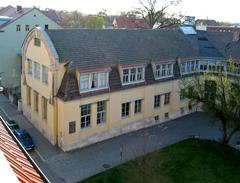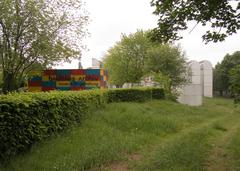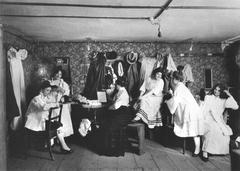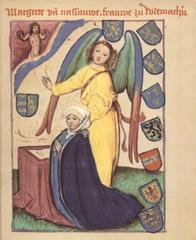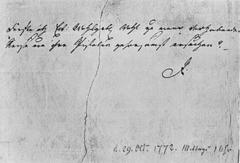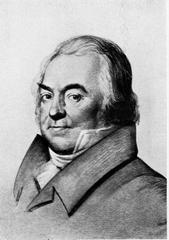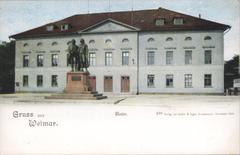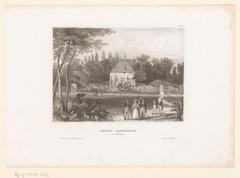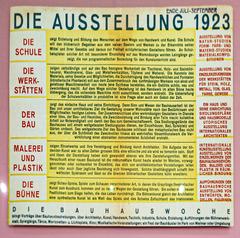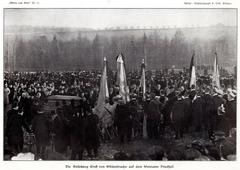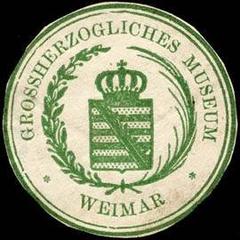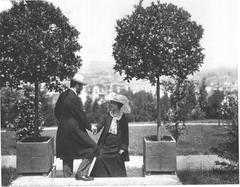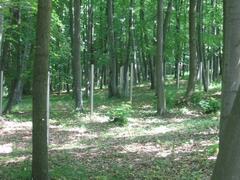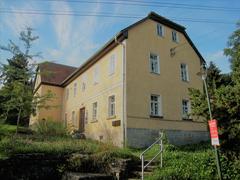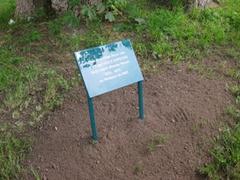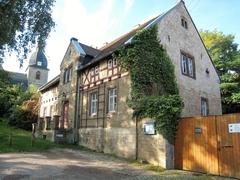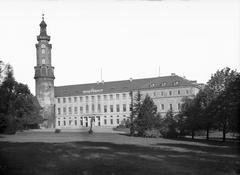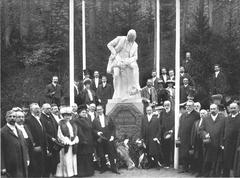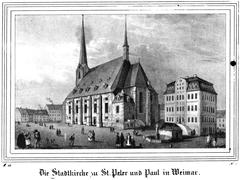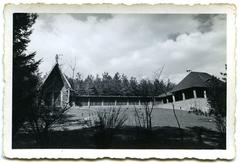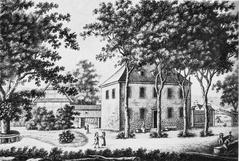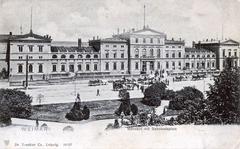
Schillerhaus Weimar: Visiting Hours, Tickets, and Historical Significance Guide
Date: 03/07/2025
Introduction to Schillerhaus Weimar
Located in the heart of Weimar, Germany, the Schillerhaus Weimar is an essential destination for anyone interested in German literature, culture, and history. Once the home of Friedrich Schiller—one of Germany’s most celebrated poets and playwrights—the house offers visitors a unique immersion into the environment where Schiller composed some of his most influential works, including “Wilhelm Tell” and “Die Braut von Messina.” Today, Schillerhaus serves as both a meticulously preserved historic residence and a vibrant museum, forming part of the UNESCO World Heritage Site “Classical Weimar” and reflecting the intellectual ferment of the Weimar Classicism movement alongside figures like Johann Wolfgang von Goethe (Klassik Stiftung Weimar, Germany Footsteps, WhichMuseum).
This comprehensive guide details the historical evolution of the Schillerhaus, provides up-to-date visitor information—including opening hours, ticketing, and accessibility—and offers practical tips for exploring both the museum and the broader cultural landscape of Weimar. Whether you’re a literature enthusiast, historian, or traveler, Schillerhaus Weimar promises a memorable journey into Germany’s literary legacy.
Table of Contents
- Introduction to Schillerhaus Weimar
- Historical Origins: From Bourgeois Residence to Schiller’s Home
- Schiller’s Final Years: Creativity and Legacy in Weimar
- Transformation into Germany’s First Poet Memorial
- The Modern Museum: Exhibitions, Accessibility, and Facilities
- Visiting Information: Opening Hours and Ticketing
- Cultural and UNESCO Significance
- Guided Tours, Programming, and Visitor Tips
- Nearby Attractions and Suggested Itineraries
- Frequently Asked Questions (FAQ)
- Conclusion and Recommendations
- Sources and Further Reading
Historical Origins: From Bourgeois Residence to Schiller’s Home
The Schillerhaus was originally constructed in 1777 as a spacious townhouse for a prosperous merchant, reflecting the architectural style of late 18th-century Weimar (im-weimarer-land.de). For several decades, it served as a residence for various families before Friedrich Schiller purchased it in 1802. At that time, Schiller was already renowned for works such as “Die Räuber,” “Kabale und Liebe,” and “Don Carlos.” Seeking a stable home for his wife Charlotte and their children, Schiller described his satisfaction in a letter to his publisher, affirming his intention to settle permanently in Weimar (klassik-stiftung.de).
Schiller undertook extensive renovations to adapt the house for his family, situating the main living quarters on the first floor and his study and personal rooms in the attic. The well-tended garden became a cherished retreat, often cited as a source of inspiration during his most productive years (weimar-touristinformation.de).
Schiller’s Final Years: Creativity and Legacy in Weimar
Between 1802 and his untimely death in 1805, Schiller experienced an extraordinarily creative period. Here, he completed “Wilhelm Tell” (1804), “Die Braut von Messina” (1803), and continued his collaboration and friendship with Goethe, further shaping the Weimar Classicism era (im-weimarer-land.de). The Schillerhaus became a gathering place for intellectuals, artists, and friends, providing a lively hub for cultural exchange.
Schiller’s death in 1805 marked the end of a prolific chapter, but the house remained a focal point of literary remembrance, first for his family and later for the broader cultural community.
Transformation into Germany’s First Poet Memorial
After Schiller’s passing, his widow Charlotte and their children continued to live in the house until 1826. Subsequently, parts of the property were let to tenants, and some original furnishings were sold (weimar-erkunden.de). Recognizing its significance, the city of Weimar acquired the house in 1847, establishing it as Germany’s first literary memorial—a model later emulated by other poet museums (klassik-stiftung.de).
Restorations in the following decades focused on recreating the house’s appearance during Schiller’s lifetime. Today, rooms such as Schiller’s study, with its original desk and bed, remain largely as they were, offering an authentic glimpse into his daily life (weimar-tourist.de).
The Modern Museum: Exhibitions, Accessibility, and Facilities
In the 1980s, a contemporary extension—the Schiller-Museum—was added behind the original house, featuring three modern halls for special and multimedia exhibitions (klassik-stiftung.de). The new wing provides barrier-free access and hosts rotating exhibitions, readings, and workshops, while the historic residence retains its period charm.
Facilities and Accessibility:
- The Schiller-Museum extension is designed for wheelchair users and visitors with mobility challenges.
- The historic house has limited accessibility due to its age; some upper floors are only reachable by stairs.
- Restrooms and a small museum shop are available on-site (WhichMuseum).
Visiting Information: Opening Hours and Ticketing
Opening Hours:
- Summer (March 21 – November 1): Tuesday to Sunday, 9:30–18:00
- Winter (November 2 – March 20): Tuesday to Sunday, 9:30–16:00
- Closed Mondays
(Check for changes on public holidays and special events.)
Ticket Prices:
- Adults: €8.00
- Reduced: €6.00 (students, seniors)
- Students (16–20): €3.00
- Children/youth up to 16: Free
- Special exhibitions: €7.00 (single), €12.00 (family)
Where to Buy:
Tickets can be purchased at the entrance or online via the official ticket shop. Combination tickets and the Weimar Card provide access to multiple cultural sites.
Cultural and UNESCO Significance
Since 1998, Schillerhaus Weimar has formed part of the “Classical Weimar” UNESCO World Heritage ensemble, reflecting the city’s pivotal role in the development of European art and thought. The museum’s stewardship by the Klassik Stiftung Weimar ensures ongoing conservation, high-quality exhibitions, and a dynamic program of events (Triphobo).
Guided Tours, Programming, and Visitor Tips
Guided Tours:
Short “Stippvisite” tours highlight Schiller’s life and work. Group tours in English and other languages are available by advance booking (with a supplementary fee) (Weimar’s official guide).
Audio Guides:
Available in multiple languages, including English and French, to enhance understanding for international visitors (whichmuseum.co.uk).
Interactive Experiences:
- The Weimar+ app offers multimedia guides and audio stops for Schillerhaus and other city landmarks (Weimar+ app).
- The Studiolo | Klassik-Werkstatt provides creative workshops suitable for families and school groups.
Visitor Tips:
- Book tickets online in advance, especially for special exhibitions (e.g., the 2025 “Faust” showcase).
- Plan for a visit of 1–2 hours to fully explore the house and museum.
- Use the Weimar Card for combined entry to multiple attractions.
- Non-German speakers should use audio guides for a comprehensive experience.
- Photography is generally permitted without flash; look for posted restrictions.
Nearby Attractions and Suggested Itineraries
Schillerhaus is centrally located among Weimar’s major cultural sites, all within walking distance:
- Goethe’s House
- Wittumspalais
- Herzogin Anna Amalia Bibliothek
- Bauhaus Museum Weimar
- Weimar City Castle
The Tourist Information Weimar provides maps and advice for building a personalized itinerary.
Frequently Asked Questions (FAQ)
Q: What are the Schillerhaus Weimar visiting hours?
A: Tuesday to Sunday, 9:30–18:00 (summer), 9:30–16:00 (winter); closed on Mondays.
Q: How much are tickets and where can I buy them?
A: Adults €8.00, reduced €6.00, students €3.00, children up to 16 free. Buy on-site or online via the official ticket shop.
Q: Is Schillerhaus wheelchair accessible?
A: The Schiller-Museum extension is accessible; the historic residence has limited accessibility. Contact the museum for assistance.
Q: Are guided tours and audio guides available in English?
A: Yes, both are available. Guided tours in English require advance booking.
Q: Can I visit other Weimar sites with the same ticket?
A: Combined tickets and the Weimar Card grant access to several landmarks.
Conclusion and Recommendations
Schillerhaus Weimar stands as a testament to the enduring power of literature and the cultural achievements of Weimar Classicism. Visitors gain insight not only into Schiller’s personal environment and creative process but also into the vibrant intellectual life of early 19th-century Germany. To make the most of your visit:
- Check current opening hours and book tickets in advance.
- Allow enough time to visit both the historic house and the Schiller-Museum extension.
- Use audio guides or the Weimar+ app for a richer, multilingual experience.
- Explore nearby UNESCO-listed sites for a comprehensive understanding of Weimar’s cultural heritage.
Stay updated on events and exhibitions via the Klassik Stiftung Weimar website and follow relevant social media channels. Download digital guides like the Weimar+ app or the Audiala app for immersive tours.
Sources and External Links
This guide draws on the following authoritative sources for information and visitor guidance:
- Klassik Stiftung Weimar – Schiller Residence
- Germany Footsteps – Things to Do in Weimar
- Klassik Stiftung Weimar – Schiller’s Home
- Thüringen Tourismusnetzwerk – Faust 2025 in Weimar
- WhichMuseum – Schiller’s House Weimar
- Tourist Information Weimar
- Triphobo – Schillerhaus Weimar
- Weimar Events 2025 PDF
- Weimar+ App Guide PDF






